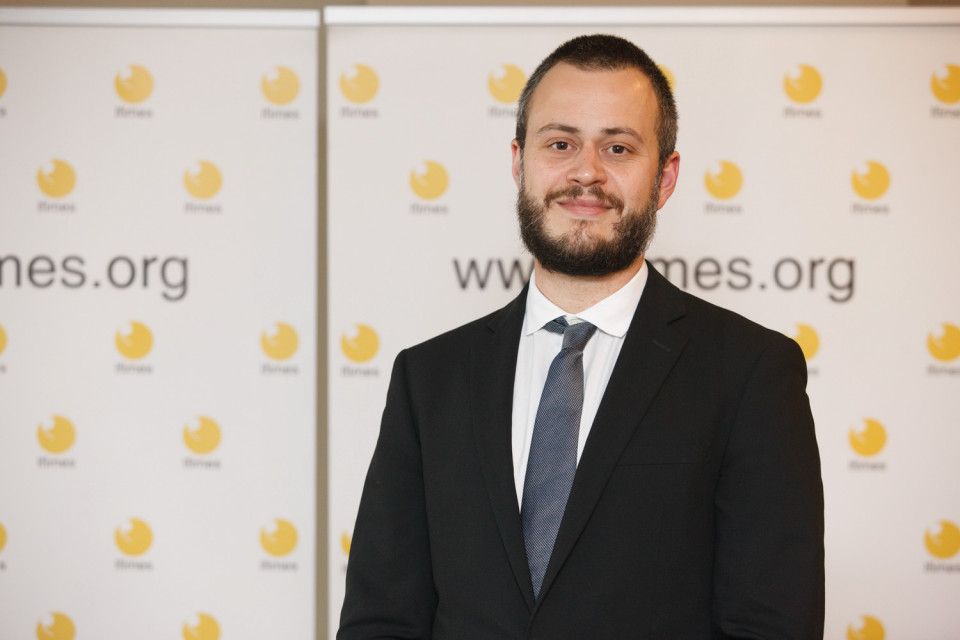International Institute for Middle East and Balkan Studies (IFIMES)[1] from Ljubljana, Slovenia, regularly analyses developments in the Middle East and the Balkans. Kristian Alexander, an advisor at Gulf State Analytics and Giorgio Cafiero, geopolitics analyst of the Middle East and a co-founder of the Washington-based analytical company Gulf State Analytics (GSA), prepared comprehensive analysis entitled “The UAE’s Growing Role in Central Asia: Geopolitical Inroads to Challenge Turkey and Iran”. They are analyzing the growing influence of a wealthy GCC state such as the UAE and how this will be important in terms of geopolitical hedging in Central Asia.

● Kristian Alexander

● Giorgio Cafiero
Since the Soviet Union imploded in 1991 and the Central Asian republics gained their independence, a host of countries have competed for geopolitical influence in this resource-wealthy region. Along with Russia, China, Turkey, Iran, the US, and a number of EU member states, the six states of the Gulf Cooperation Council (GCC) have been actively working to strengthen their clout in this region, with the United Arab Emirates (UAE) taking the lead.
Central Asia may not be as important to the UAE’s national interests as the Middle East and North Africa (MENA). Yet, the Muslim-majority Central Asian countries are becoming more geopolitically significant from the standpoint of Abu Dhabi’s foreign policy. The UAE’s interests in Central Asia have important albeit often overlooked implications for Abu Dhabi’s geopolitical rivalry with Turkey and Iran. This rivalry stems from competing Islamic visions and ideologies and is now extending to Central Asia from the MENA region as the three actors compete over economic, energy and religious interests to gain political leverage and consolidate their presence in this region. Kazakhstan and the other Central Asian states are thus likely to find themselves in the crosshairs of these multifaceted power struggles between the UAE, Turkey and Iran.
Ankara and Tehran have had limited success in terms of establishing strong footholds in Central Asia. Turkey has not taken full advantage of the cultural, linguistic and ethnic links shared with the Turkic countries of Central Asia. Turkish businesses have effectively exploited first entry privileges, but Turkey’s relatively strong economic presence in Central Asia has not translated into as much political capital as some experts were predicting amid the 1990s. Iran, meanwhile, has had a rather tumultuous relationship with neighboring Turkmenistan and faces other challenges, including US sanctions, in its efforts to consolidate influence in Central Asia.
Against this backdrop, GCC states such as the UAE face limited competition from Turkey and Iran when it comes to making economic and political inroads in Central Asia[2]. Given the ongoing rivalry between the UAE, Turkey, and Iran in the MENA region, it is more than likely that the Emirates will seek to exploit its advantages over Turkey and Iran in Central Asia, leveraging the UAE’s economy, great power backing and financial resources to consolidate geopolitical influence in this region.
Within this context, the odds are good that Saudi Arabia will work closely with the UAE in order to challenge both Ankara and Tehran’s agendas in Central Asia, as Abu Dhabi and Riyadh have done in numerous other countries. Israel too will likely see the UAE as an important interlocutor to check both Iranian and Turkish influence in the former Soviet space. The extent to which the Israelis leveraged their relationship with Azerbaijan is reflective of this desire to capitalize on links with states that have land or maritime borders with Iran in order to challenge Tehran’s regional and international ambitions.
In Central Asia, the UAE is using its financial clout to expand its geopolitical influence. Through investments and trade, the Emirati leadership is determined to make the UAE an increasingly critical player in the economic development of the Central Asian republics, chiefly Kazakhstan. In recent years, the UAE’s main sovereign wealth fund, Mubadala, has made major investments across Central Asia, especially in energy and port infrastructure. For example, Mubadala has invested in Kazakhstan’s energy projects and Uzbekistan’s power generation and distribution. The Dubai-based logistics giant DP World has played a critical role in the building of Kazakhstan’s Aktau port and the Khorgos Special Economic Zone. Dragon Oil, an independent international oil and gas exploration, development and production business which is also Dubai-based, is the only non-Turkmen entity pumping Turkmen oil.
Kazakhstan’s Astana International Financial Center (AIFC), established in 2015, is boosting the country’s extra-regional trade. The AIFC project aims to “create a regional financial services hub that leverages Kazakhstan's strategic geographic location between Asian, European and Middle Eastern markets,” as Theodore Karasik, the senior advisor at Gulf State Analytics, explained. Notable in this regard, is that the Dubai International Financial Center and Abu Dhabi’s Global Market were the models for AIFC’s establishment.
Indeed, officials in Central Asia believe the UAE can serve as a model to achieve economic diversification beyond hydrocarbons while achieving a “successful integration” of the UAE into the global economy, according to Rauf Mammadov, resident scholar on energy policy at the US-based Middle East Institute[3]. The main focus of various Central Asian states is establishing foundations for a post-oil economy while also seeking to strengthen relations with the US, a key partner of the UAE, and thereby increase the ability of Central Asian republics to balance difficult relations with Russia and China in the region. The UAE serves as model and partner in relation to renewable/clean energy technology and nuclear energy and, like Israel, also holds the benefit of fostering warmer relations with the US. The recent oil price collapse is likely to further accelerate efforts to diversify economic growth models, particularly in Kazakhstan and Uzbekistan, thereby strengthening Abu Dhabi’s efforts in these domains.[4]
As countries in Central Asia face difficulties in terms of moving their economic models past dependency on oil and gas, lessons about creating a knowledge-based economy are valuable. While the UAE continues to face challenges in this domain, the country remains a leader in the GCC when it comes to economic diversification as highlighted by the success of Dubai’s non-oil sectors such as tourism, banking and logistics.
More recently, the UAE’s diversification model has sought to follow the Chinese model of “authoritarian capitalism”, with the UAE striving to draw benefits from Beijing’s Belt and Road Initiative (BRI).Shipbuilding (dry-docks) have attracted major Emirati investments in Kazakhstan and are part and parcel of the supply chain corridor along China’s BRI. Caspian ports located in Kazakhstan and Turkmenistan have become important maritime trade links connecting the Black Sea, Europe, the Middle East and Asia.
Along with Russia and China, the UAE is also engaged in “humanitarian diplomacy” as countries battle the COVID-19 pandemic. Abu Dhabi’s help to Kazakhstan, Kyrgyzstan and Uzbekistan is relevant in this regard, boosting the UAE’s ‘soft-power’ in Central Asia. On April 18, the Kazak ambassador to Abu Dhabi, Madyar Menelikov, hailed the 13 tons of medical and preventive supplies sent to Kazakhstan by the UAE. Around that same time, the Emiratis delivered seven tons of medical supplies to Kyrgyzstan, which the UAE’s ambassador to Uzbekistan (who is also the country’s non-resident ambassador to Bishkek), Saeed Al Qamzi, said was designed to “advance our Kyrgyz partners’ efforts to contain COVID-19 in the quickest and safest manner possible.” On May 5, he confirmed that the UAE had also delivered five tons of aid to Uzbekistan to help the county’s struggle against COVID-19.
For the UAE, the pandemic is not only a grave threat but also an opportunity to tout its humanitarian credentials on the international stage. Although Abu Dhabi’s humanitarian assistance to Iran amid the COVID-19 crisis might be most significant from a geopolitical perspective, the UAE’s aid to Central Asian countries during this period will serve to strengthen Abu Dhabi’s reputation in the region. At the same time, the Turkish government is also practicing its own “corona diplomacy” in Central Asia, pursuing similar aims to those of the Emirates.Thus, the humanitarian diplomacy from Abu Dhabi and Ankara must be understood partly within the context of their growing competition for geopolitical influence throughout the wider Islamic world.
From Washington’s perspective, a greater Emirati role in Central Asia could potentially serve US interests as Abu Dhabi’s influence in the region may also help Central Asian republics balance Moscow and Beijing’s strong geopolitical and economic positions in Central Asia. Nonetheless, with the UAE and the other five GCC states having their own vested interests in further strengthening their own already strong ties with Russia and China, Abu Dhabi will seek to avoid controversies. The UAE has no desire to add friction to Abu Dhabi’s relationships with Moscow and Beijing, which have grown significantly in recent years, and are instrumental to the UAE’s own long-term interests.
Economic interests are undoubtedly important to the UAE’s foreign policy in Central Asia. In all probability, however, such interests are secondary to the Emiratis’ geopolitical objectives, both in Central Asia and the MENA. As Central Asia remains a complex region defined by multifaceted rivalries in an increasingly multipolar world, the growing influence of a wealthy GCC state such as the UAE will be important in terms of geopolitical hedging. With Kazakhstan, Kyrgyzstan, Tajikistan, Turkmenistan, and Uzbekistan remaining largely within the orbits of Moscow and Beijing, establishing deeper ties with the UAE serves to further diversify their global partnerships, ultimately assisting Central Asian republics to balance their foreign relations, potentially allowing them increased flexibility to maneuver between Russia, China, the US, and other regional powers in this increasingly congested region.
Authors:
Kristian Alexander is an advisor at Gulf State Analytics, and an assistant professor at the College of Humanities and Social Sciences, Zayed University, Abu Dhabi.
Giorgio Cafiero is the CEO of Gulf State Analytics.
Ljubljana/Doha/Dubai, 5 June 2020
Footnotes:
[1] IFIMES – International Institute for Middle East and Balkan Studies, based in Ljubljana, Slovenia, has Special Consultative status at ECOSOC/UN, New York, since 2018.
[2] Author Interview with Mr. Mammadov, 14 May 2020. Mr. Mammadov is resident scholar on energy policy at the US-based Middle East Institute.
[3] Interview with Mr. Mammadov, May 14, 2020
[4] Phone conversation with Dr. Luca Anceschi on May 12, 2020. Dr. Luca Anceschi is a Senior Lecturer in Central Asian Studies CEES Glasgow University.